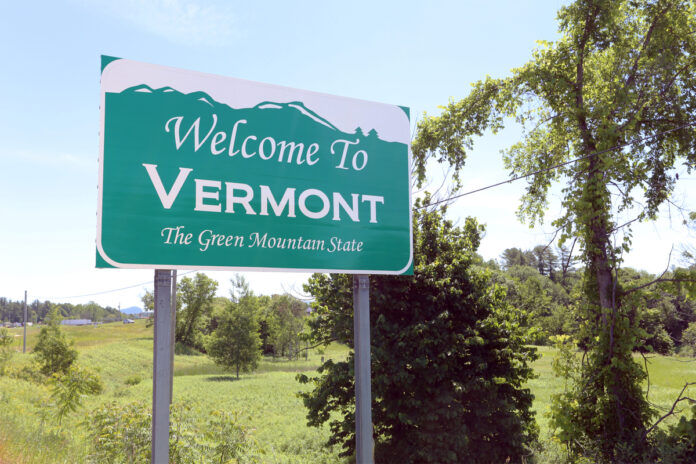MONTPELIER, Vt. – Vermont is set to become the eleventh state in the nation to regulate and tax recreational cannabis sales after Governor Phil Scott (R) allowed measure S.54 to move forward—without his signature. Vermonters age 21 and over have been allowed to possess up to one ounce of cannabis flower since 2018, however, an infrastructure to allow retail sales did not exist before this week. The new law will take effect October 1, 2020; legal sales through dispensaries are not expected to begin until 2022.
Under the new law, a Cannabis Control Board will be established to regulate and license recreational and medical cannabis businesses. Among its multitude of provisions, S.54 also sets potency limits for adult-use sales, bans the sale of flavored vape cartridges, mandates independent lab testing for purity and potency, requires law enforcement personnel to complete sixteen hours of Advanced Roadside Impaired Driving Enforcement training, and allows local municipalities to authorize or restrict recreational sales.
In a letter to the state Senate, Governor Scott applauded the legislature’s efforts to create a regulated marketplace, but also said, “there is still more work to be done to ensure the health and safety of our kids and the safety of our roadways—we should heed the public health and safety lessons of tobacco and alcohol. Further, I believe we are at a pivotal moment in our nation’s history which requires us to address systemic racism in our governmental institutions. We must take additional steps to ensure equity is a foundational principle in a new market.”
Much of the governor’s remaining concerns about S.54 relate to social equity. “Of primary concern is the licensing construct which will disproportionately benefit Vermont’s existing medical dispensaries by giving them sole access to integrated licenses and an unfair head start on market access,” Scott said. “This creates an inequitable playing held both for our smaller minority and women-owned business applicants, and other small Vermont growers and entrepreneurs.
“I encourage the Legislature to look to the State of Illinois as a benchmark in how to create a cannabis market that is equitable and moves toward economic justice. We have already enacted similar provisions such as expungement measures. However, some of the additional supports the Legislature should consider include creating a social equity applicant category for cannabis establishment licenses, a 50 percent licensing fee waiver for these applicants, and additional technical and financial supports. And in the event the Legislature maintains the current integrated licensing structure, to make it more equitable revenues from those licensees could be directed to benefit social equity applicants and the communities historically most negatively impacted by cannabis enforcement. Again, justice should be foundational to our work, not an add-on to be figured out secondary to commercial or other interests,” said Governor Scott.
Economic impact
In addition to the state’s 6 percent sales tax, S.54 mandates a 14 percent excise tax on all recreational sales. Sales tax revenues will be used to fund after-school and summer learning programs while 30 percent of the excise tax revenue will be dedicated to “substance misuse prevention programming.” Medical cannabis sales to patients and caregivers will be tax-free.
Allowing recreational sales of cannabis could provide substantial benefits for Vermont’s economy. An economic report from the law firm Vicente Sederberg LLP estimates Vermont residents may spend over $200 million per year on cannabis products purchased at legal dispensaries. This would generate tens of millions in tax revenues through 2025. These funds may be critical as Vermont tries to recover economically from the COVID-19 pandemic.
Industry support
Cannabis industry members and advocates have come out in support of cannabis legalization in Vermont.
“Senate Bill 54 represents an opportunity to bring common-sense controls to the adult-use marijuana marketplace, which is currently unregulated, unlicensed, and untaxed,” said NORML State Policies Coordinator Carly Wolf.
“Regulating cannabis in the Green Mountain State will create jobs and much-needed tax revenue while finally providing resident cannabis consumers with a safe, reliable, and legal source of cannabis within their own borders,” said Aaron Smith, co-founder and chief executive officer at the National Cannabis Industry Association.
Steven Hawkins, executive director at Marijuana Policy Project, was excited to see cannabis legalization enjoying bi-partisan support. “The significance of Vermont’s decision to legalize and regulate cannabis sales, especially in a state with a Republican governor and through the legislative process, cannot be overstated,” he said. “Poll after poll shows that Republicans support cannabis legalization, and more and more, we see elected Republicans publicly taking that same stance and standing up for their constituents and their ideological base. The fact that Vermont accomplished this through the legislative process is also incredibly important because it shows that representative, democratic government is up to this challenge and is proving responsive to average citizens.”











